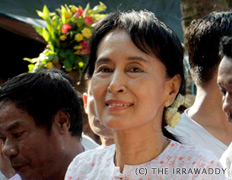
News about Daw Aung San Suu Kyi
Since her release on 13 November 2010, Daw Aung San Suu Kyi has proven that she continues to be a powerful force for social and political progress in Burma.
Follow her efforts to promote human rights, social development, democracy and national reconciliation in Burma in the following articles about her work, her words, and her long-awaited release.
Posts about ‘Daw Aung San Suu Kyi’
Foreign Secretary meets Aung San Suu Kyi in London
Boris Johnson has welcomed Burmese leader and State Counsellor Daw Aung San Suu Kyi on her first visit outside of Asia since her party’s historic election success in November 2015 […]
| |The Elders welcome Myanmar peace conference
The Elders warmly welcome the Union Peace Conference convened by State Counsellor Daw Aung San Suu Kyi […]
| |Burma: US Should Retain Key Sanctions
The United States government should keep in place sanctions on Burma to deter the Burmese military from derailing democratic reforms, Human Rights Watch said today […]
| |Advisory Commission on Rakhine State – A Welcome Investigation into Arakan State’s Human Rights and Humanitarian Crisis
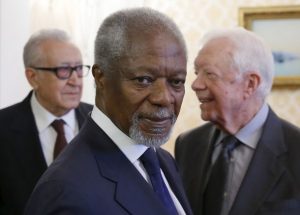
On 23 August 2016, the Ministry of the Office of the State Counselor announced the formation of a nine-member Advisory Commission on Rakhine State […]
| |Statement of ARNO on Daw Aung San Suu Kyi’s 21st Century Panglong Convention
1. The Panglong Agreement signed on February 12, 1947 between the independence hero late Gen. Aung San and leaders of the several ethnic groups in Panglong, Shan State, was an epoch-making event in the history of Burma to build the Union of Burma together. The history of Burma/Myanmar would have developed differently if there was no Panglong Treaty […]
| |Strong and Unequivocal Condemnation of Malicious Threats and Extremist Activities
1. The international terrorist group ISIS has made threats targeting the Prime Minister of Malaysia and other high government officials. It is especially worrisome and of great concern, that the State Counsellor of Burma Daw Aung Suu Kyi is also named as one of the targets […]
| |The Need for Peace and Inclusion
The peoples of Myanmar have long desired a platform for inclusive peace and dialogue where the vital issues of politics, economics, welfare and human rights for all can be discussed together, fully and in a spirit of national reconcilitation and cooperation. Thus any initiative towards peace and dialogue is always welcome […]
| |Burma Army Moves to Tighten Grip on Power
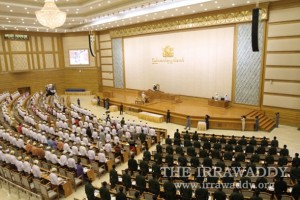 While people were still in a buoyant mood over the November 2015 elections results, wrapping up last year’s work and preparing for 2016, the Burma Army and the Government had a clearly different agenda, initiating several discreet moves in an attempt to maintain its grip on power during the term of the future National League for Democracy (NLD) Government […]
While people were still in a buoyant mood over the November 2015 elections results, wrapping up last year’s work and preparing for 2016, the Burma Army and the Government had a clearly different agenda, initiating several discreet moves in an attempt to maintain its grip on power during the term of the future National League for Democracy (NLD) Government […]
Victims’ Voices and Healing a Must for Genuine Reconciliation
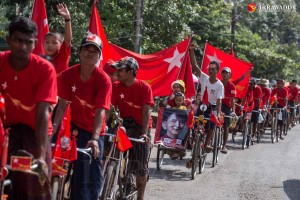 Much has been made of the series of meetings between Daw Aung San Suu Kyi and several key individuals after the elections, including the current Commander-in-Chief of the Burma Army, Senior General Min Aung Hlaing. But none generated more headlines than the meeting on 4 December, 2015 with retired Senior General Than Shwe, leader of the former military junta and head of state until 2011, purportedly to discuss and ensure a smooth transition of power.
Much has been made of the series of meetings between Daw Aung San Suu Kyi and several key individuals after the elections, including the current Commander-in-Chief of the Burma Army, Senior General Min Aung Hlaing. But none generated more headlines than the meeting on 4 December, 2015 with retired Senior General Than Shwe, leader of the former military junta and head of state until 2011, purportedly to discuss and ensure a smooth transition of power.
Such meetings, while raising eyebrows, are more than just symbolic and should be read in the context of Burma’s troubled past with elections and power transfer. The emphatic victory at the November 2015 polls was similar to the 1990 elections, which later saw the annulment of the results and extension of power by the military.
Seen in this light, these meetings reveal the complexity of the power transfer, the actors that still wield considerable political capital, and the different interests in directing the transition. It is also fair to infer that a relatively seamless power transfer to the incoming National League for Democracy (NLD) Government can be expected, given the apparent endorsement and pledge of support from senior figures from the previous military regime such as Than Shwe […]
| |Voter Disenfranchisement Rife as Millions Unable to Vote
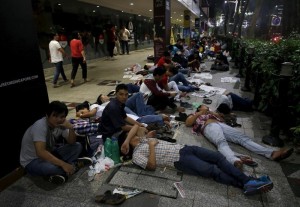 The process of advanced voting in Burma has begun amid much confusion and contradiction. According to The Myanmar Times, election commission officials have offered countering details regarding the timeline of the advanced voting and foreign observers have reported being unaware that the process had even begun […]
The process of advanced voting in Burma has begun amid much confusion and contradiction. According to The Myanmar Times, election commission officials have offered countering details regarding the timeline of the advanced voting and foreign observers have reported being unaware that the process had even begun […]









 All posts
All posts